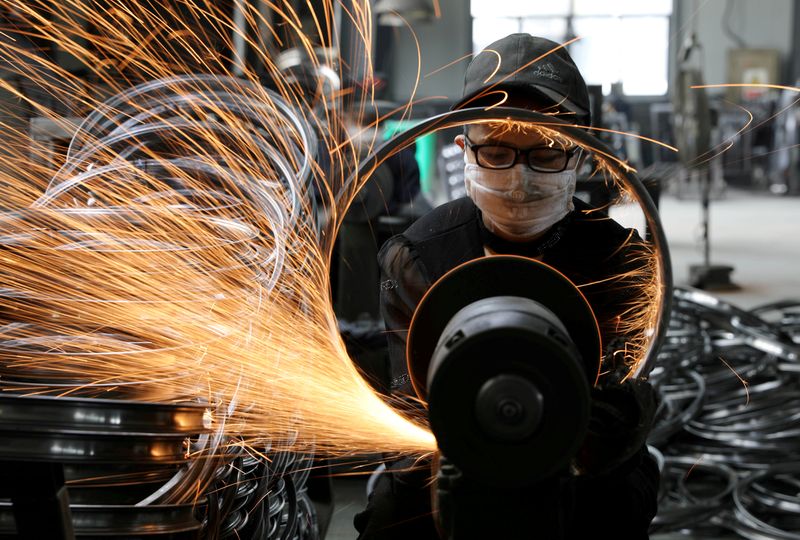By Rae Wee
SINGAPORE (Reuters) - The world's biggest factory and most populous nation has opened for business after three years, leading to a surge in demand as well as concerns it will add to global inflationary pressures. But economists say investors need not worry too much.
China's swift dismantling of a zero-COVID policy has come as global central banks are saying the fastest rate hikes in a generation will need to go further to rein in rising prices, fuelling worries that pent-up mainland demand will trigger another wave of inflation.
Anticipation of a flurry of spending has driven up prices of everything from copper to shares in luxury fashion houses.
However, economists see no challenge to global inflation, pointing instead to Chinese President Xi Jinping's new blueprint for self-sufficiency, broader prosperity and a socialist ideology as checks on big-ticket shopping.
The slack in China's labour markets and Beijing's growth priorities will also take the edge off inflation, they say.
"I don't think China's recovery or the reopening will cause any significant global inflation," said Chi Lo, senior market strategist for Asia Pacific at BNP Paribas (EPA:BNPP) Asset Management.
A recovery is likely to be inwardly focused and unlikely to substantially lift the yuan, reducing the chances of pushing up export prices or driving price rises elsewhere, he added.
Worries that Chinese demand could force the U.S. Federal Reserve and other central banks to increase rates further are "overblown", Lo said. BNP's portfolio managers are positioning for China's rebound to boost regional tourism, but not export price rises for manufactured goods.
FULL TANKS
In commodity markets too, where China is a price-setter for iron ore and the second-biggest consumer of oil, further sharp price gains due to the reopening are unlikely.
Metals markets have already priced in some new demand, with copper futures breaching a $9,000 per tonne level last month for the first time since June.
"The old infrastructure spending, basically roads, bridges, airports and ports; China will still build them", but that kind of spending will not be a priority in the next decade, said Lo, who anticipates only a marginal tailwind for commodities.
New kinds of infrastructure spending, such as on technology, is less intensive in terms of bulk commodities, Lo added.
China has also benefited from the cheap Russian oil imports, and has stockpiled, curbing oil demand as a source of inflation.
There is solace in the near absence of price pressures on the mainland too, given the moderation in economic growth and a rising domestic currency.
In 2022, economic growth slumped to one of its worst levels in nearly half a century, at 3.0%.
UBS' APAC Chief Investment Office estimates China's full-year GDP could potentially reach around 5% this year, but inflation will accelerate "only modestly" to 3%, and J.P. Morgan analysts think it will start to pare back.
SUPPLY SIDE
A weak labour market will also rein in inflation in China, which has not made the direct stimulus payments that drove hiring and spending in most Western economies.
Beijing's "common prosperity" policy has slashed pay and perks for bankers, while youth unemployment hit a record 20% last year.
"There is so much spare capacity in China ... it doesn't feel like you're going to have a shortage of labour. You don't have the great resignation like you had in the rest of the world" due to the pandemic, said May Ling Wee, a portfolio manager at Janus Henderson Investors.
But inflation could emerge if and when consumers plough their 17.8 trillion yuan of savings into travel and discretionary shopping, analysts cautioned.
"The large savings in China can definitely support a recovery of consumption - the question is how much more people are willing to spend," said Ricky Tang, co-head of client portfolio management at Value Partners Group.
Average airfares for flights to and from China in January were more than double 2019 prices, data from ForwardKeys showed, despite there being no immediate surge in travel.
It will be "many months" before Chinese tourist crowds arrive in Western airports given curbs on travellers from the mainland, limited flight capacity and high fares, said Olivier Ponti, ForwardKeys' vice president of insights.
"It is also likely that there will be issues with visas and delays renewing passports."
Years spent getting supply chains in order are also helping ease price pressures. Pork production is a case in point.

It hit an eight-year high in 2022 and prices fell 10.8% in January. Factory-gate prices are going down, which analysts say raises the prospect of a "Goldilocks" scenario of steady growth without exporting inflation.
"I'm very much of the view that (China's reopening) will be positive for the world in terms of either not being too inflationary, but more widely having deflation in some key new goods and services," Westpac senior economist Elliot Clarke said.